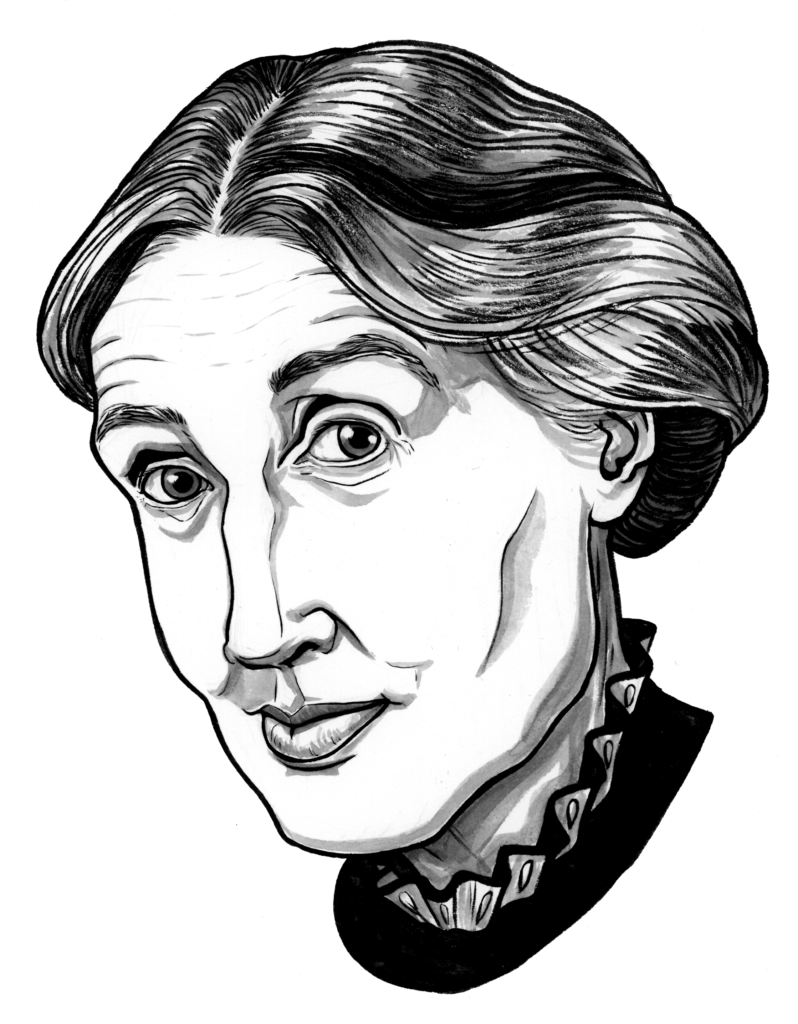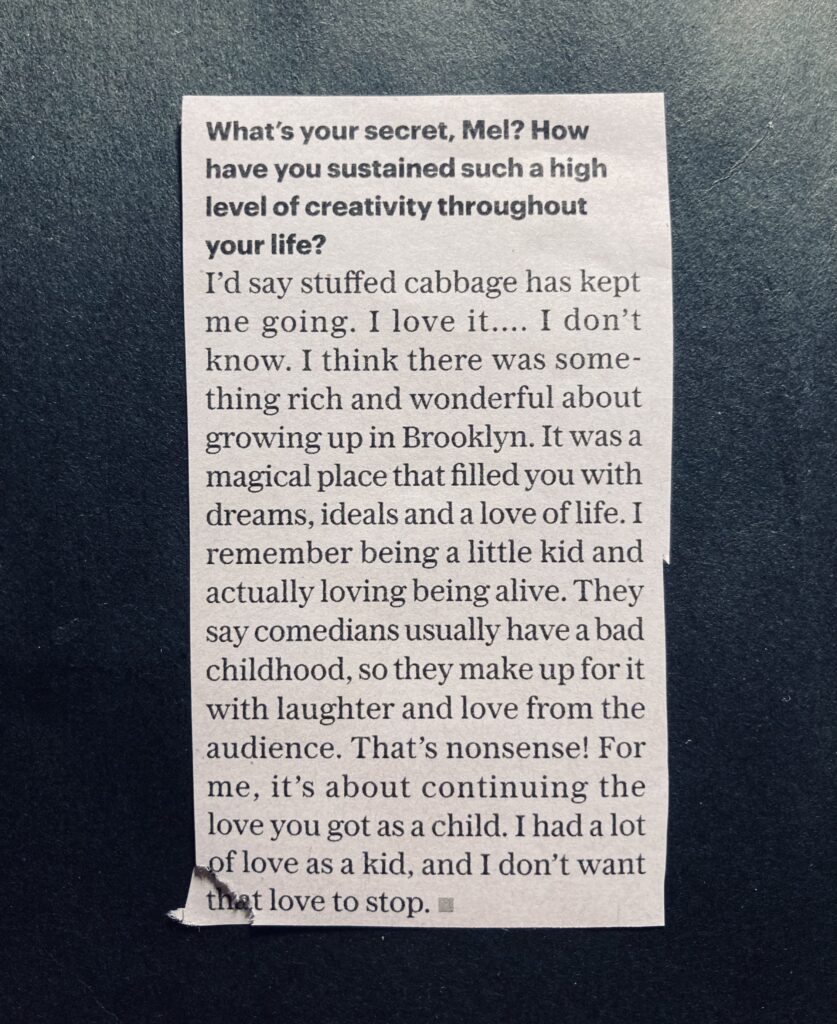
Tag: reading
Trying not to be precious about year-end stuff right now because I’m feeling stuck, but here’s a big list of things I read in 2021! Reading was hard this year for…well, you know. All the reasons. I needed a lot of comfort food to get through the upheaval of moving home, and for huge swaths of time I felt as if I’d lost access to the part of my brain that thrilled to Alberto Manguel or Le Guin in the first part of the year. I’m still sort of there.
Read a lot of comics (thanks, Danielle’s studio library and also The Actual Library) because I started drawing a graphic novel and it turns out reading more comics helps your brain think in comics??? Who knew. I still feel like I’m scratching my way towards figuring out what really makes a comic work for me. It takes a lot to get me excited about them, which feels somewhat icky as a person who knows first-hand how much fucking time they take. But there it is!
Started trying to track rough start/end dates towards the second half of the year because I got curious. I’ll probably stick with that into 2022.
Bubble and The Liar’s Dictionary both made me laugh out loud. The Creative Habit and Always Coming Home reminded me how I got to be the way I am. I’m sure there are other books I felt feelings about but I’m just going to HIT PUBLISH.
See previously: 2020’s Big List
| Legend | Rough Guide to Ratings |
|---|---|
| 🎭 – Plays 📝 – Poetry 📖 – Books (Fiction) 📓 – Books (Nonfiction) 💬 – Graphic Novels | ❤︎ = Yes ❤︎❤︎ = Oh Yes ❤︎❤︎❤︎ = Oh Hell Yes |
- 📝 An Ocean of Static – J.R. Carpenter
- 📓 The Book of Delights – Ross Gay ❤︎
- 💬 Oksi – Mari Ahokoivu
- 📖 The Djinn Falls in Love and Other Stories – Ed. Mahvesh Murad & Jared Shurin
- 📖 Solaris — Stanisław Lem
- 📖 The Liar’s Dictionary – Elly Williams ❤︎❤︎
- 📖 There but for the – Ali Smith ❤︎❤︎
- 📓/📝 Bluets – Maggie Nelson ❤︎
- 📖/🎭/📝/📓 Always Coming Home – Ursula K. Le Guin ❤︎❤︎❤︎
- 📖 Never Mind – Edward St. Aubyn
- 📖 Bad News – Edward St. Aubyn
- 📖 Some Hope – Edward St. Aubyn
- 📓 A Reader on Reading – Alberto Manguel ❤︎❤︎❤︎
- 📖 Mother’s Milk – Edward St. Aubyn
- 📖 At Last – Edward St. Aubyn
- 🔄 📖 Guards! Guards! – Terry Pratchett ❤︎
- 📓 The Mother of All Questions – Rebecca Solnit
- 🔄 💬 Delilah Dirk and the Pillars of Hercules – Tony Cliff ❤︎
- 📖 The Fellowship of the Ring – J.R.R. Tolkien
- 📖 The Mezzanine – Nicholson Baker ❤︎
- 📓 Big Magic – Elizabeth Gilbert ❤︎
- 📖 The Two Towers – J.R.R. Tolkien
- 📖 The Return of the King – J.R.R. Tolkien (Finished April 20th)
- 📖 Wonder Tales of Seas and Ships – Frances Carpenter (April 22nd – April 27)
- 🔄📖 The Raw Shark Texts – Steven Hall (July 20th – July 27th) ❤︎❤︎
- 💬 Slaughterhouse-Five – Kurt Vonnegut, Ryan North, Albert Monteys (August 4th) ❤︎
- 💬 Lucky Penny – Ananth Hirsh and Yuko Ota (August 4th)
- 💬 Kodi – Jared Cullum (August 6th)
- 💬 The Loneliness of the Long-Distance Cartoonist – Adrian Tomine (August 8th)
- 💬 Girl Town – Casey Nowak (August 9th)
- 💬 My Life in Transition – Julia Kaye (August 9th)
- 💬 Bubble – Jordan Morris, Sarah Morgan, Tony Cliff, Natalie Riess (August 12th) ❤︎❤︎
- 📖 The Accidental – Ali Smith (August 23rd)
- 💬 Don’t Go Without Me – Rosemary Valero-O’Connell (August 24th) ❤︎❤︎❤︎
- 🔄 📖 The Brief and Frightening Reign of Phil – George Saunders
- 📖 Water for Elephants – Sara Gruen (Finished Sept. 8th)
- 📖 All Systems Red – Martha Wells (Sept. 10th)
- 📖 Artificial Condition – Martha Wells (Sept. 10th)
- 📖 Rogue Protocol – Martha Wells (Sept. 10th-11th)
- 📖 Exit Strategy – Martha Wells (Sept. 11th)
- 📖 The Absolute Book – Elizabeth Knox (Sept. 30th? – Oct 17th)
- 📓 The Library at Night – Alberto Manguel (April 22nd – October 19th)
- 📖 Sphinx – Anne Garréta (Oct 28-30)
- 💬 Draw Stronger – Kriota Willberg (Oct 30)
- 📓 Goodbye Again – Jonny Sun
- 📖 The 7 1/2 Deaths of Evelyn Hardcastle – Stuart Turton (Nov. 18th-20th) ❤︎
- 📖 Milk Blood Heat – Dantiel W. Moniz (Nov. 20th-22nd) ❤︎
- 📖 The Devil and the Dark Water – Stuart Turton (Nov. 27th-Dec 2nd)
- 💬 Piece by Piece: the Story of Nisrin’s Hijab – Priya Huq (Dec. 6th)
- 💬 The Legend of Auntie Po – Shing Yin Khor (Dec. 7th) ❤︎❤︎
- 💬 Treasure in the Lake – Jason Pamment (Dec. 9th)
- 📖 The Glass Hotel – Emily St. John Mandel (Dec. 15th-17th) ❤︎
- 📓 The Collected Schizophrenias – Esmé Weijun Wang (Dec. 18th)
- 💬 Tell No Tales – Sam Maggs and Kendra Wells (Dec. 15th-21st)
- 📓 The Creative Habit – Twyla Tharp (Dec. 22nd) ❤︎❤︎❤︎
- 📓 Intimations – Zadie Smith (Dec. 28th) ❤︎
- 📓 I Shock Myself – Beatrice Wood (Dec. 25th – Dec. 31st) ❤︎
I expect and hope that eventually I will no longer be a public person — no blog, no Twitter, no public online presence at all.
I have no plan. I’m feeling my way to that destination, which is years off, surely, and I just hope to manage it gracefully. (I don’t know of any role models with this.)
Brent Simmons
Brent spearheads NetNewsWire, the open source app I use and love for reading blogs via RSS. I didn’t even know he had a blog until Winnie (who, I should point out, I never would’ve met if she hadn’t tagged me in a post she’d written in response to something on this blog a week or so ago) wrote a little about the magic of the app being free earlier today.
I wonder about this, too. Whether there are people I know who are already working towards having not less of an online presence, but zero online presence. What it would feel like to return to the liberating anonymity of growing up on the early internet. Whether I’ll ever reach a stage of life where I can withdraw permanently, or if I’ll want to, or if it’ll always be a seasonal ebb and flow.
Glad I’m not the only one.
If we could just—just stop. For one year. If everybody could stop publishing their poems. No more. Stop it. Just—everyone. Every poet. Just stop.
But of course that’s totally unfair to the poets who are just starting out. This may be their “wunderjahr.” This may be the year that they really find their voice. And I’m telling them to stop? No, that wouldn’t do.
But wouldn’t it be great? To have a moment to regroup and understand? Everybody would ask, Okie doke, what new poems am I going to read today? Sorry: none. There are no new poems. And so you’re thrown back onto what’s already there, and you look at what’s on your own shelves, that you bought maybe eight years ago, and you think, Have I really looked at this book? Might have something to it. And it’s there, it’s been waiting and waiting. Without any demonstration or clamor. No squeaky wheel. It’s just been waiting.
If everybody was silent for a year—if we could just stop this endless forward stumbling progress—wouldn’t we all be better people? I think probably so. I think the lack of poetry, the absence of poetry, the yearning to have something new, would be the best thing that could happen to our art. No poems for a solid year. Maybe two.
—Nicholson Baker, The Anthologist
I am wired for coming home in the same way it is assumed we are wired for leaving. Any adventure that lures me out is no match for the ties that draw me home again. I come home in the way you’d fall asleep after a day spent in the heat of the sun—before you know it’s happened, before you know you want to. Half the pang of growing up for me was realizing that I’d somehow have to create a sense of home wherever I went, that for all the effort I spent trying to leave, all I would ever want to do is figure out homecomings, ways of returning to the place where I feel the most like me.
Libby sent me this Rainesford Stauffer essay from The Atlantic (adapted from her book An Ordinary Age) and god damn. It’s about home and motion and FOMO and belonging and it is very, very good.
Where do you feel safe, and like you belong? Are you homesick for many places, like a hometown and a college town and maybe somewhere entirely different? Is it possible to have roots in multiple places?
The last one: woof.
I spent so much of my childhood wrestling with confusion over where I was supposed to fit in. English parents, California upbringing. Older family, only child. House full of books and in-jokes and accents and cultural references my peers didn’t get. A voice that sounded out of place on family visits to the UK. I wanted so badly to figure out why it was so hard for me to feel a sense of belonging, or why, when I did find a place that seemed to capture the rare scent of home, I couldn’t quite fit in.
It’s a much longer conversation than I have time to dive into now, but that question—the notion of being homesick for many places—just knocked the wind out of me. I stopped wrestling with it quite as much as I got older—partly because I began to grow more comfortable with myself, but also because I started to feel shame around wanting to explore immigration or dual nationality or being a third culture kid when a) my nationality is split between two massively privileged, problematic countries, and b) I’m white.
I know it’s not that binary. I’ve had rich, magical conversations with friends from varied nationalities who have enunciated things I never thought I’d hear another person capture. We’ve found common ground in those moments and it has felt like a form of belonging—of home. But I’m still scared to claim it. The focus at this moment in time (rightly so) is on making space for the intersections of identity that have been elided or repressed by White Supremacist culture to be heard. I don’t feel like I have the right to take up space with my own investigation into why I feel out of place—at least not in public. I know, on some level, I am robbing myself by doing this, but I’m still trying to find my way toward the method that feels both ethically considerate and true.
Anyway, the Stauffer essay. It was very good.
Take an old man’s word; there’s nothing worse than a muddle in all the world. It is easy to face Death and Fate, and the things that sound so dreadful. It is on my muddles that I look back with horror—on the things that I might have avoided. We can help one another but little. I used to think I could teach young people the whole of life, but I know better now, and all my teaching of George has come down to this: beware of muddle.
— E.M. Forster, A Room with a View
I underlined this passage hard when I read it last year. Muddle. Yes. I know this state well, although I often refer to it as waffling.
Here’s what I notice about waffling: I do it often, and it’s almost always to justify not doing something that I know, deep down, will bring me joy.
- Quitting social media platforms that no longer make me feel connected to my community
- Leaving relationships that aren’t fulfilling or functional
- Starting creative projects that intimidate me
- Getting in the sea
- Doing literally anything that I think of as benefitting me and me alone
There’s a paragraph from Twyla Tharp’s The Creative Habit that lodged firmly in my brain when I first read it in college. (I loaned my copy of the book to a friend years ago and it was only recently returned it to me, so this is the first chance I’ve had to go back and reread it in a long, long while.)
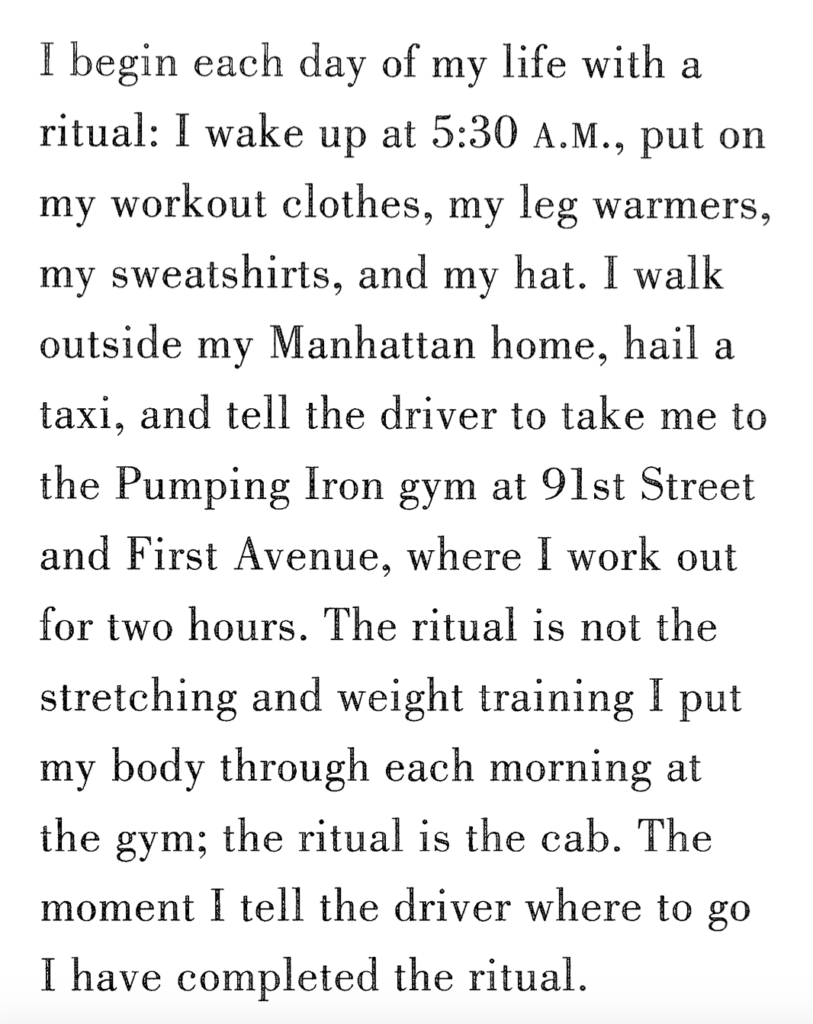
THE RITUAL IS THE CAB.
Eh-hem. Anyway. She goes on:
Turning something into a ritual eliminates the question, Why am I doing this? By the time I give the taxi driver directions, it’s too late to wonder why I’m going to the gym and not snoozing under the warm covers of my bed. The cab is moving. I’m committed. Like it or not, I’m going to the gym.
The ritual erases the question of whether or not I like it. It’s also a friendly reminder that I’m doing the right thing. (I’ve done it before. It was good. I’ll do it again.)
This bit at the end! The question of “whether or not I like it” immediately countered with the truth that if this ritual is something I have built that will carry me towards things I have decided are meaningful to me, then it will automatically be the right thing.
But even when the right thing has proved, time and time again, to be rich, pleasurable, surprising, rewarding, and thrilling, I still have a brain that fixates on the times it is not. Sometimes it is infuriating, terrifying, or disappointing (although almost always those feelings come at the start, not during the act itself—or after the finish). I latch onto the negatives, drowning in avoidance, believing I can think my way around them.
Tharp’s model requires a clear-eyed statistician’s view—an assessment of the facts. And the fact is I feel good about the act of creation far more often than I feel bad about it. The ritual becomes a method of tipping over the edge into that inexorable slide—the point where it would be far more work to turn back than it is to go forward. The point where you can’t help yourself.
This is the mantra I need going into my next project, quaking in my boots because it all feels new and beyond my capacity or control:
I’ve done it before. It was good. I’ll do it again.
I’ve been thinking a lot about about cleverness these last few weeks and how central a thing I think it is in the people I’m drawn to, but also how the term is often used in a slightly perjorative sense. And then of course here comes Ali Smith again just wrecking my shit out of nowhere without a care in the world in the last chapter of There but for the:
“Then she asked Mr. Garth did he really think there wasn’t anything wrong with being cleverest. Top of Mount Cleverest, Mr. Garth said. Brooke laughed. Then Mr. Garth said really slowly:
the fact is, that at the top of any mountain you’ll feel a bit dizzy because of the air up there. Cleverness is great. It’s a really good thing, when you have it. But there’s no point in just having it. You have to know how to use it. And when you know how to use your cleverness, it’s not that you’re the cleverest anymore, or are doing it to be cleverer than anyone else like it’s a competition. No. Instead of being the cleverest, the thing to do is become a cleverist.”
UGH I LOVE THIS WOMAN’S BRAIN.
The landing outside our bedrooms is tiny—barely big enough for one person to stand alongside the single floor vent that’s supposed to heat the entire upstairs. But! There’s enough wall space for two tall pieces of paper, so that’s where Zina and I have kept our reading lists since 2015.
I’ve never really gotten into tracking my reading online, so this practice has served as my visual archive of books devoured. It’s a lovely way to remind myself of when influential authors first appeared in my life, and to lend shape to the years. I used to keep the old ones pinned up in my room for easy access, but my impending move has meant getting rid of a lot of papery ephemera, so here they all are for posterity:
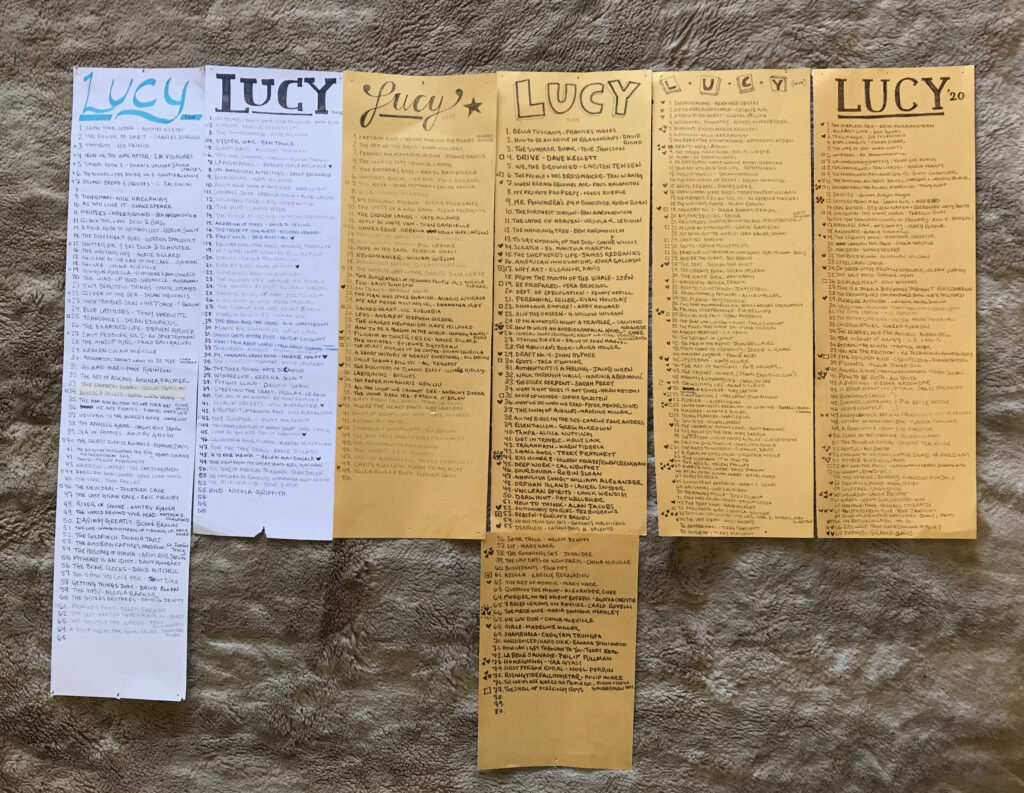
Since I’m trying to keep more of myself on my own site, I figured I’d upload the whole catalogue from 2020 as a blog post. I’ll do a followup with a little more about my absolute favorites, but for now: here’s everything.
| Legend | Rough Guide to Ratings |
|---|---|
| 🎭 – Plays 📝 – Poetry 📖 – Books (Fiction) 📓 – Books (Nonfiction) 💬 – Graphic Novels | ❤︎ = Yes ❤︎❤︎ = Oh Yes ❤︎❤︎❤︎ = Hell Yes |
- 📖 The Starless Sea – Erin Morgenstern ❤︎
- 📓 All About Love – bell hooks
- 📓 Trick Mirror – Jia Tolentino ❤︎❤︎
- 📓 Atomic Habits – James Clear
- 📓 The Way of Zen – Alan Watts
- 💬 Unversed – Ed. Jonathan Hill
- 💬 Uncomfortably Happily – Yeon-Sik Hong
- 💬 The Chancellor and The Citadel – Maria Frantz
- 💬 The Northwest Passage (Vol. 1) – Scott Chantler
- 💬 The Hunting Accident – David L. Carlson & Landis Blair ❤︎
- 💬 Delilah Dirk and the Pillars of Hercules – Tony Cliff ❤︎❤︎
- 📓 Deviced – doreen dodgen-magee
- 📝/📓 Letters from Max – Sarah Ruhl & Max Ritvo ❤︎❤︎❤︎
- 📓 Van Gogh – Steven Naifeh & Gregory White Smith ❤︎
- 💬 Gaugin: The Other World – Fabrizio Dori
- 📖 The Ten Thousand Doors of January – Alix E. Harrow
- 📓 Madness, Rack, and Honey – Mary Ruefle ❤︎
- 📖 Axiomatic – Maria Turmakin
- 📓 The Crying Book – Heather Christle ❤︎❤︎
- 📖 Looking for Jake – China Miéville
- 🎭 Macbeth – William Shakespeare
- 📖 The Bird King – G. Willow Wilson ❤︎
- 📖 Steel Crow Saga – Paul Krueger
- 📖 On Earth We’re Briefly Gorgeous – Ocean Vuong ❤︎
- 📓 The Salt Path – Raynor Wynn
- 💬 Displacement – Kiku Hughes
- 📓 Time is a Thing the Body Moves Through – T. Fleischmann
- 📖 The Raconteur’s Commonplace Book – Kate Milford
- 📓 Pleasure Activism – adrienne maree brown ❤︎
- 📖 Tales from 1001 Nights – Trans. Malcolm & Ursula Lyons
- 📖 The Fifth Season – N.K. Jemesin
- 📖 The Mermaid, The Witch, and The Sea – Maggie Tokuda-Hall
- 📓 Constellations – Sinead Gleeson
- 📖 The Reapers are The Angels – Alden Bell
- 📓 The Weight of Glory – C.S. Lewis
- 📖 Gideon the Ninth – Tamsyn Muir
- 📖 You Are the Friction – Ed. Jez Burrows & Anna Hurley
- 💬 The Golden Age – Cyril Pedrosa & Roxanne Moreil ❤︎
- 📖 Flights – Olga Tokarczuk
- 📖 Annabel Scheme and The New Golden Gate – Robin Sloan ❤︎
- 📖 How to Be Both – Ali Smith ❤︎❤︎❤︎
- 📖 A Burning – Megha Majumdar
- 📖 If Beale Street Could Talk – James Baldwin
- 📖 Blandings Castle – P.G. Wodehouse
- 📖 Summer Lightning – P.G. Wodehouse
- 📖 Heavy Weather – P.G. Wodehouse
- 📓 Funny Weather: Art in an Emergency – Olivia Laing ❤︎❤︎
- 📝 Citizen: An Americal Lyric – Claudia Rankine
- 📖 A Room with A View – E.M. Forster ❤︎
- 📓 Close to the Machine – Ellen Ullman ❤︎
- 📓 The Power of Ritual – Casper ter Kuile
- 📖 Artful – Ali Smith ❤︎❤︎❤︎
- 📓 Coming to Writing and Other Essays – Hélène Cixous ❤︎
- 📖 Attrib. – Eley Williams ❤︎❤︎❤︎
- 💬 Go With The Flow – Lily Williams & Karen Schneemann
- 💬 Knight and Beard (Vol. 1) – Tara Kurtzhals & Sarah Bollinger
- 📓 The Heroine’s Journey – Maureen Murdock
- 📖 Each of Us a Desert – Mark Oshiro ❤︎
- 📖 Self Care – Leigh Stein
- 💬 Syllabus – Lynda Barry ❤︎❤︎❤︎
- 💬 Grass – Keum Suk Gendry-Kim
- 📝 Handwriting – Michael Ondaatje
- 📓 Letters from Tove – Tove Jansson ❤︎❤︎❤︎
- 📝/📓 Rilke on Love and Other Difficulties – Trans. John J.L. Mood
- 🎭 The Tempest – William Shakespeare
- 💬 The Best We Could Do – Thi Bui ❤︎
- 📝 Beowulf – Maria Dahvana Headley ❤︎❤︎
- 📝 The Rime of the Ancient Mariner – Samuel Taylor Coleridge
- 📖 Piranesi – Susanna Clarke ❤︎❤︎
- 📓 A Reading Life – C.S. Lewis
- 📓 Better than IRL – Ed. Katie West & Jasmine Elliott ❤︎
- 📓 Split – Ed. Katie West & Jasmine Elliott
- 📖 The Waves – Virginia Woolf ❤︎❤︎
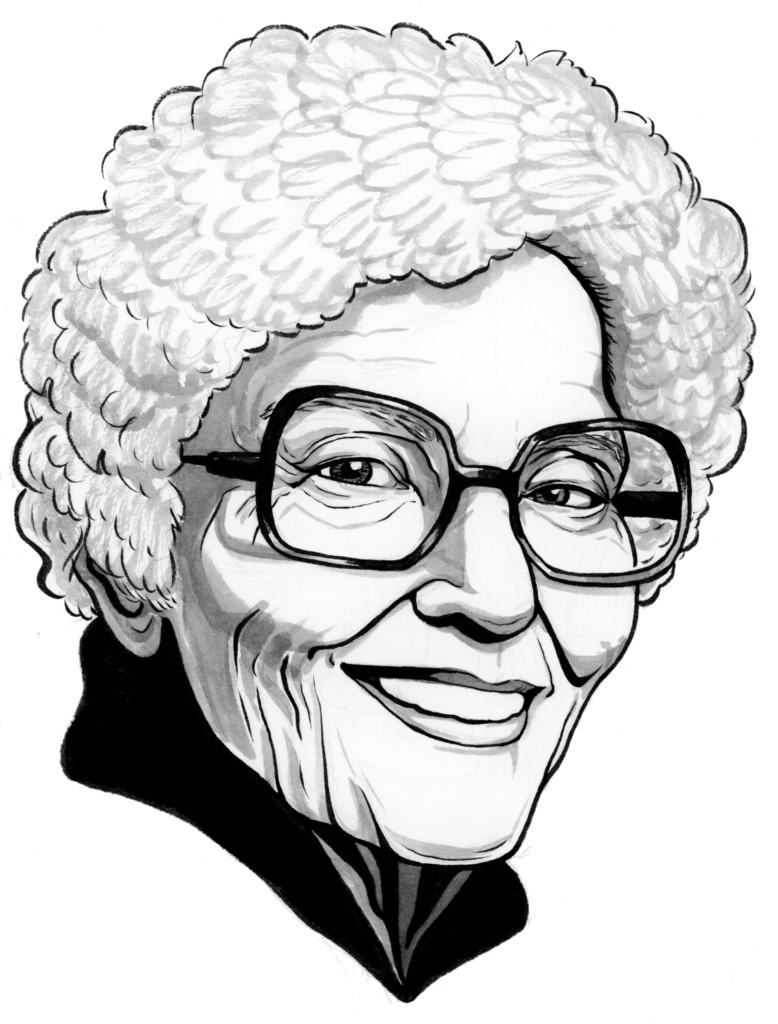
![A complex mind map connecting various names and creative works of nine people, mostly female writers.
The following themes are positioned throughout the page like nodes:
[See Me / Don’t See Me]
[Gardening]
[Queer Relationships]
[Utopia]
[Solitude]
[Fluidity]
[Rhythm]
Ursula K. (Kroeber) Le Guin 1929 - 2018
“The Carrier Bag Theory of Fiction" 1988 in Women of Vision
2010: Began [Age 81] Blogging
No Time to Spare (pub. 2017, HMH)
A left-handed Commencement Address, 1983 Mills College
The Wave in The Mind (pub. 2004, Shambhala)
Epigraph: “As for the mot juste, you are quite wrong. Style is a very simple matter: it is all rhythm. Once you get that you can't use the wrong words. But on the other hand here am I sitting after half the morning, crammed with ideas, and visions, and so on, and can't dislodge them, for lack of the right rhythm. Now this is very profound, what rhythm is, and goes far deeper than words. A sight, an emotion, creates this wave in the mind, long before it makes words to fit it, and in writing (such is my present belief) one has to recapture this, and set this working (which has nothing apparently to do with words) and then as it breaks and tumbles in the mind, it makes words to fit it. But no doubt I shall think differently next year.” (Woolf to Sackville-West, 1926).
Virginia Woolf (1882-1941)
1931 Professions For Women
“It is a very strange thing that people will give you a motor car if you will tell them a story. It is a still stranger thing that there is nothing so delightful in the world as telling stories."
"The Angel in the house"
Orlando
The Waves
1929 Room of One’s Own
Met Sackville-West in 1922
Gail Godwin (b. 1937)
1977 (NYT) The Watcher at the Gates
12 Short Stories and Their Making (2005, Persea)
Appeared with Le Guin in same publication
“A story larger than my own” Working On An Ending, 2014
"Now I do a lot of lying around. I finally I have accepted that my supine dithering is fertile and far from a waste of time"
Harold Nicolson (1886-1968) <-> Vita Sackville-West (1892-1962)
Nigel Nicolson (1917-2004)
Portrait Of A Marriage (1973)
Not to be confused with
Nigel Nicholson -> [Classics] [Reed College]
"The Bright Chimera" R. Rawdon Wilson
Olivia Laing (1977-)
Married Ian Patterson (1948) in 2018 [29 years apart!]
May Sarton (1912-1995)
(At Yaddo) "I hated all the shop talk. I'd rather see people who are carpenters, who are sailors or who work in healthy departments, because then I feel I am learning something about life."
“There is much less anguish and self-doubt. You are much more able to function freely, spontaneously, as yourself."
met Woolf in 1937](https://lucybellwood.com/wp-content/uploads/2021/03/IMG_5457-scaled.jpeg)
